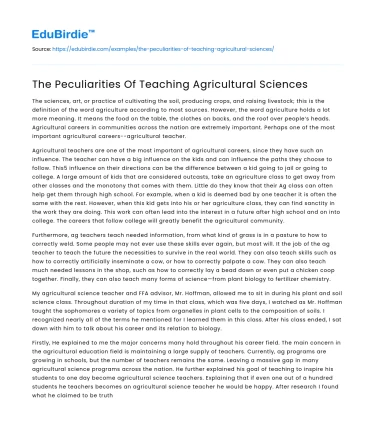The sciences, art, or practice of cultivating the soil, producing crops, and raising livestock; this is the definition of the word agriculture according to most sources. However, the word agriculture holds a lot more meaning. It means the food on the table, the clothes on backs, and the roof over people’s heads. Agricultural careers in communities across the nation are extremely important. Perhaps one of the most important agricultural careers--agricultural teacher.
Agricultural teachers are one of the most important of agricultural careers, since they have such an influence. The teacher can have a big influence on the kids and can influence the paths they choose to follow. This5 influence on their directions can be the difference between a kid going to jail or going to college. A large amount of kids that are considered outcasts, take an agriculture class to get away from other classes and the monotony that comes with them. Little do they know that their Ag class can often help get them through high school. For example, when a kid is deemed bad by one teacher it is often the same with the rest. However, when this kid gets into his or her agriculture class, they can find sanctity in the work they are doing. This work can often lead into the interest in a future after high school and on into college. The careers that follow college will greatly benefit the agricultural community.
Save your time!
We can take care of your essay
- Proper editing and formatting
- Free revision, title page, and bibliography
- Flexible prices and money-back guarantee
Furthermore, ag teachers teach needed information, from what kind of grass is in a pasture to how to correctly weld. Some people may not ever use these skills ever again, but most will. It the job of the ag teacher to teach the future the necessities to survive in the real world. They can also teach skills such as how to correctly artificially inseminate a cow, or how to correctly palpate a cow. They can also teach much needed lessons in the shop, such as how to correctly lay a bead down or even put a chicken coop together. Finally, they can also teach many forms of science—from plant biology to fertilizer chemistry.
My agricultural science teacher and FFA advisor, Mr. Hoffman, allowed me to sit in during his plant and soil science class. Throughout duration of my time in that class, which was five days, I watched as Mr. Hoffman taught the sophomores a variety of topics from organelles in plant cells to the composition of soils. I recognized nearly all of the terms he mentioned for I learned them in this class. After his class ended, I sat down with him to talk about his career and its relation to biology.
Firstly, He explained to me the major concerns many hold throughout his career field. The main concern in the agricultural education field is maintaining a large supply of teachers. Currently, ag programs are growing in schools, but the number of teachers remains the same. Leaving a massive gap in many agricultural science programs across the nation. He further explained his goal of teaching to inspire his students to one day become agricultural science teachers. Explaining that if even one out of a hundred students he teachers becomes an agricultural science teacher he would be happy. After research I found what he claimed to be truthful. There is a growing demand for agricultural teachers and a dwindling supply of people declaring agricultural education as their major. Many professionals across the nation, believe this will cause many issues in the future.
After thoroughly discussing the downfalls of the career, we moved on to the biology related subjects. Mr. Hoffman told of the many biology-related class he took while pursuing his degree in agricultural education. From molecular biology to plant science—biology holds a very important role in any agricultural career field. It can be used to craft fertilizers for varying plants, to diagnose sick livestock animals, or to generate new varieties of certain plants. Mr. Hoffman explained the importance and told me about projects he assigns to his plant and soil science class. The project forces students to research a biological topic pertaining to agriculture, one of the best ones I saw was about the application of molecular biology in agriculture. The student explained how genetically engineered crops are entering markets around the globe and what effects this will have on the agriculture industry. After working through this job shadow, I not only learned the importance of agriculture for our society but also the important role of biology in the agriculture industry.






 Stuck on your essay?
Stuck on your essay?

